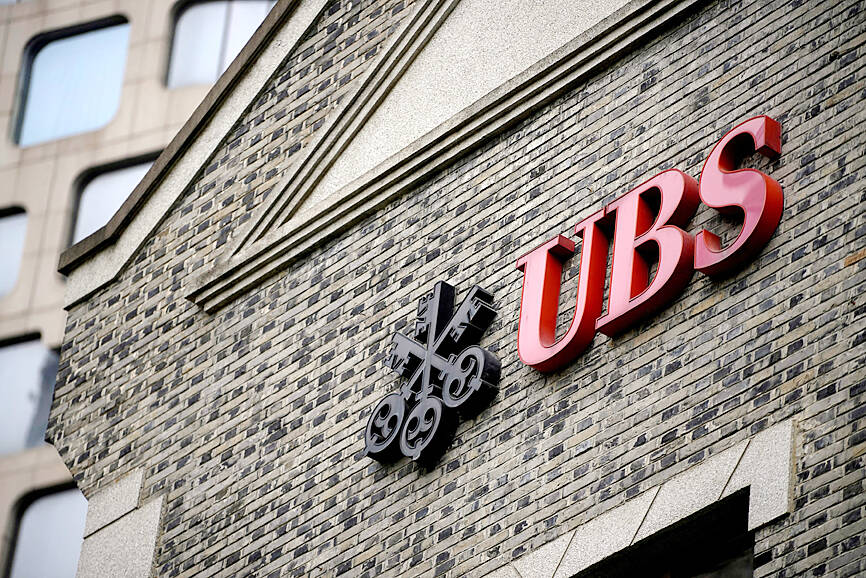Taiwan is to see a surge in millionaires by 2028, outgrowing the rest of the world, a UBS report published on Wednesday said.
The number of adults worth more than US$1 million would have risen in 52 of 56 markets by 2028, UBS said in its UBS Global Wealth Report 2024. The fastest growth in millionaires — 47 percent — was expected to be in Taiwan, driven by the country’s microchip industry.
Overall, in dollar terms, global wealth grew by 4.2 percent last year, after a decline of 3 percent in 2022, the study said.

Photo: Aly Song, Reuters
UBS said that over the 15 years it has published its report, the Asia-Pacific region has posted the biggest growth in wealth, up almost 177 percent, followed by the Americas at about 146 percent, while Europe, the Middle East and Africa (EMEA) was up 44 percent.
However, Asia-Pacific had also seen the sharpest increase in debt, the report said. Total debt in the region was up by more 192 percent since 2008, more than 20 times the growth in EMEA and almost four times the rise for the Americas.
The UK is likely to lose about one in six of its US dollar millionaires by 2028, but their number is set to grow in other countries, including the US, and surge in Taiwan, it said.
The number of US dollar millionaires in the UK would fall by 17 percent from 3,061,553 last year to 2,542,464 in 2028. It also forecast a 4 percent fall in the Netherlands from 1,231,625 to 1,179,328.
The shift away from the UK partly reflected the fact that, with the third-highest number of millionaires, its figure was currently “disproportionately high,” UBS Global Wealth Management chief economist Paul Donovan said.
“You have obviously seen in the UK, over the last few years, as you have seen in other countries, implications arising from sanctions against Russia,” Donovan told a press conference.

POWERING UP: PSUs for AI servers made up about 50% of Delta’s total server PSU revenue during the first three quarters of last year, the company said Power supply and electronic components maker Delta Electronics Inc (台達電) reported record-high revenue of NT$161.61 billion (US$5.11 billion) for last quarter and said it remains positive about this quarter. Last quarter’s figure was up 7.6 percent from the previous quarter and 41.51 percent higher than a year earlier, and largely in line with Yuanta Securities Investment Consulting Co’s (元大投顧) forecast of NT$160 billion. Delta’s annual revenue last year rose 31.76 percent year-on-year to NT$554.89 billion, also a record high for the company. Its strong performance reflected continued demand for high-performance power solutions and advanced liquid-cooling products used in artificial intelligence (AI) data centers,

SIZE MATTERS: TSMC started phasing out 8-inch wafer production last year, while Samsung is more aggressively retiring 8-inch capacity, TrendForce said Chipmakers are expected to raise prices of 8-inch wafers by up to 20 percent this year on concern over supply constraints as major contract chipmakers Taiwan Semiconductor Manufacturing Co (TSMC, 台積電) and Samsung Electronics Co gradually retire less advanced wafer capacity, TrendForce Corp (集邦科技) said yesterday. It is the first significant across-the-board price hike since a global semiconductor correction in 2023, the Taipei-based market researcher said in a report. Global 8-inch wafer capacity slid 0.3 percent year-on-year last year, although 8-inch wafer prices still hovered at relatively stable levels throughout the year, TrendForce said. The downward trend is expected to continue this year,

Vincent Wei led fellow Singaporean farmers around an empty Malaysian plot, laying out plans for a greenhouse and rows of leafy vegetables. What he pitched was not just space for crops, but a lifeline for growers struggling to make ends meet in a city-state with high prices and little vacant land. The future agriculture hub is part of a joint special economic zone launched last year by the two neighbors, expected to cost US$123 million and produce 10,000 tonnes of fresh produce annually. It is attracting Singaporean farmers with promises of cheaper land, labor and energy just over the border.

US actor Matthew McConaughey has filed recordings of his image and voice with US patent authorities to protect them from unauthorized usage by artificial intelligence (AI) platforms, a representative said earlier this week. Several video clips and audio recordings were registered by the commercial arm of the Just Keep Livin’ Foundation, a non-profit created by the Oscar-winning actor and his wife, Camila, according to the US Patent and Trademark Office database. Many artists are increasingly concerned about the uncontrolled use of their image via generative AI since the rollout of ChatGPT and other AI-powered tools. Several US states have adopted